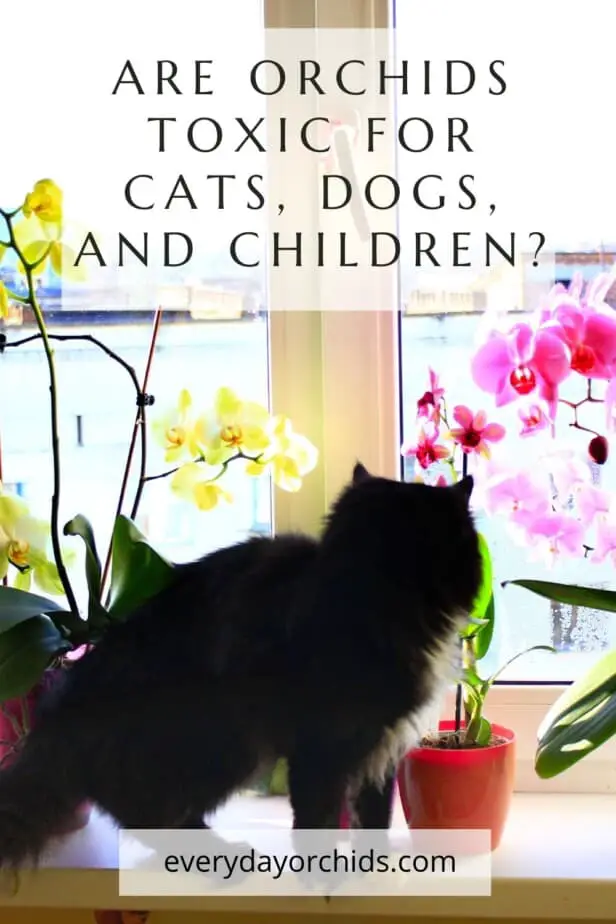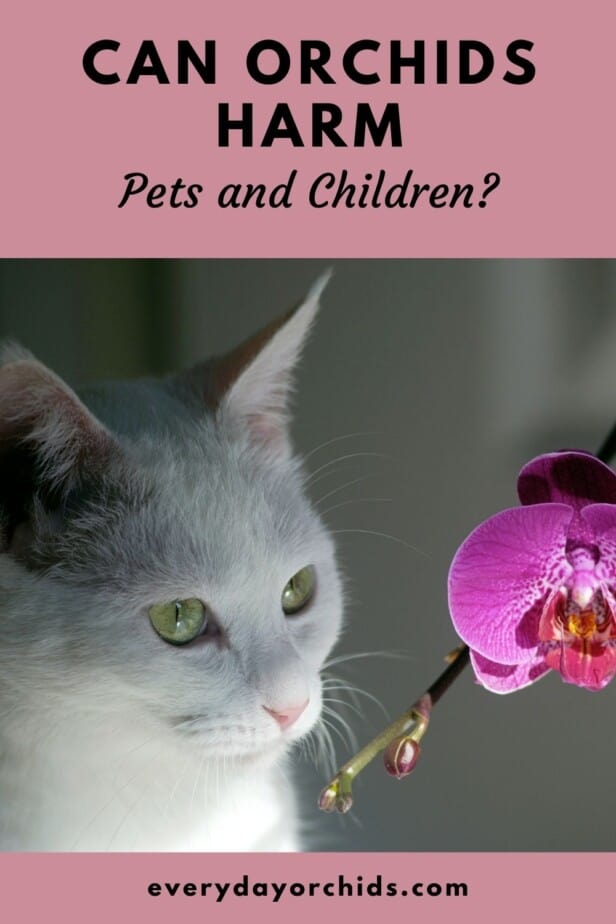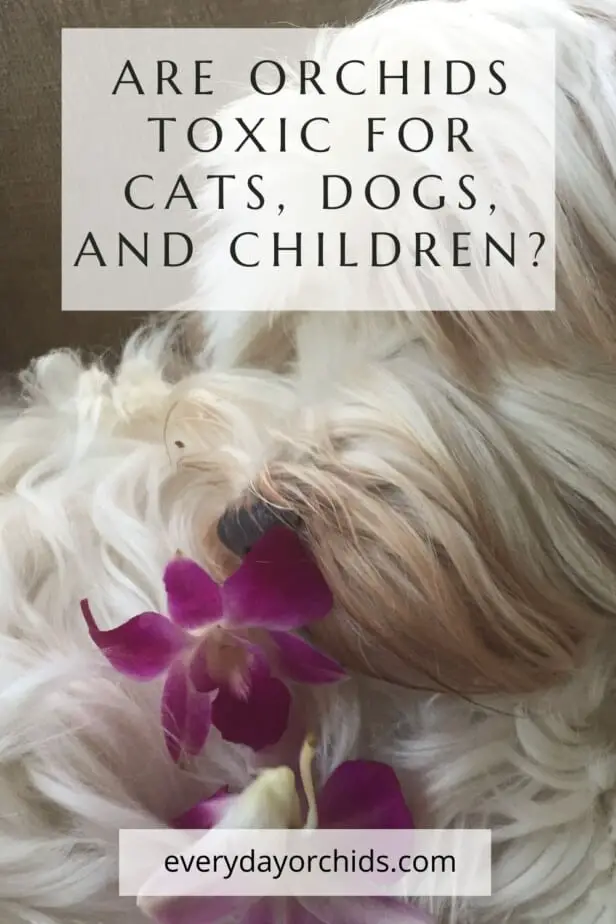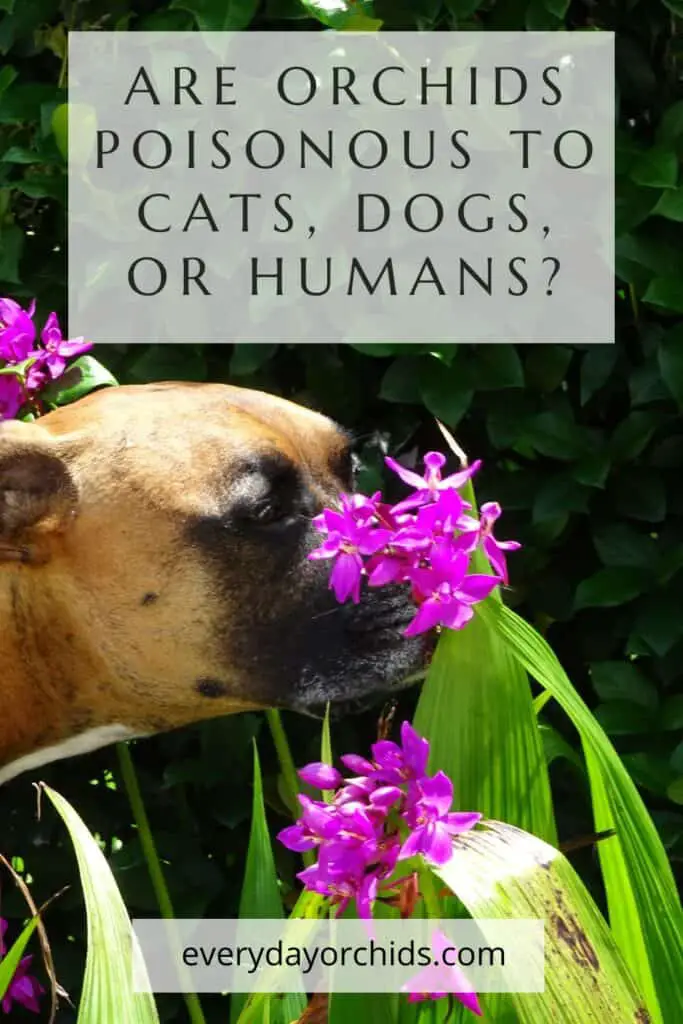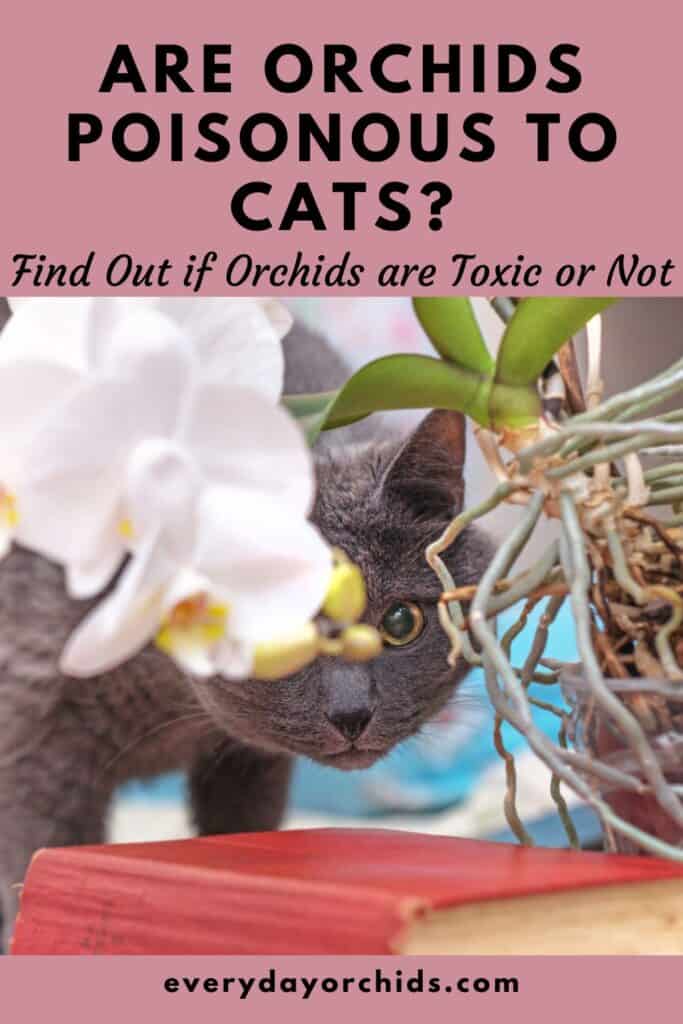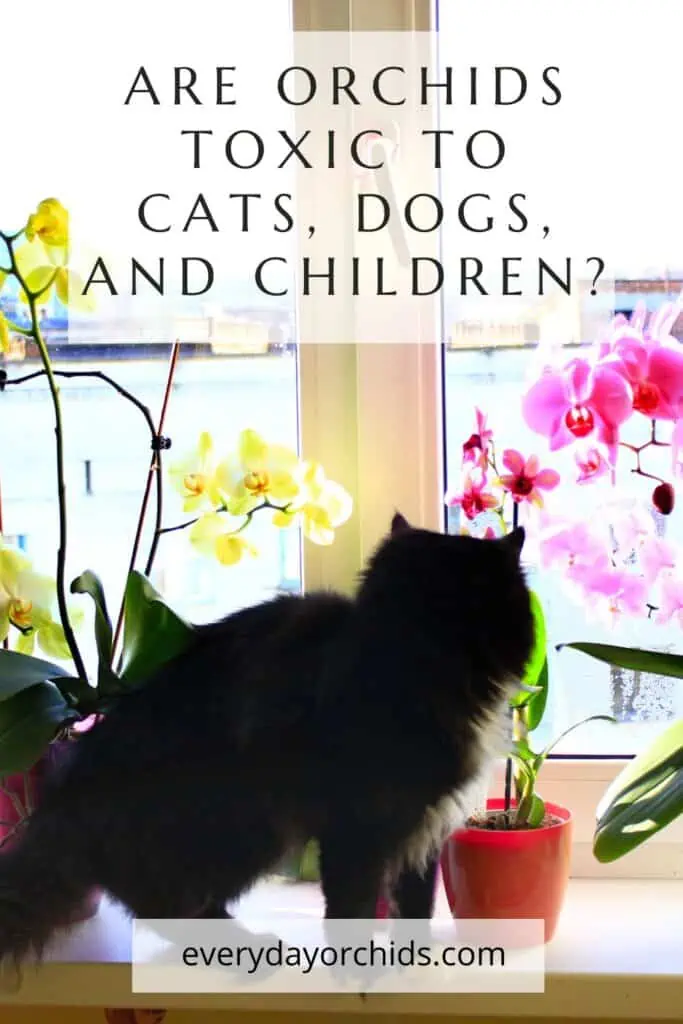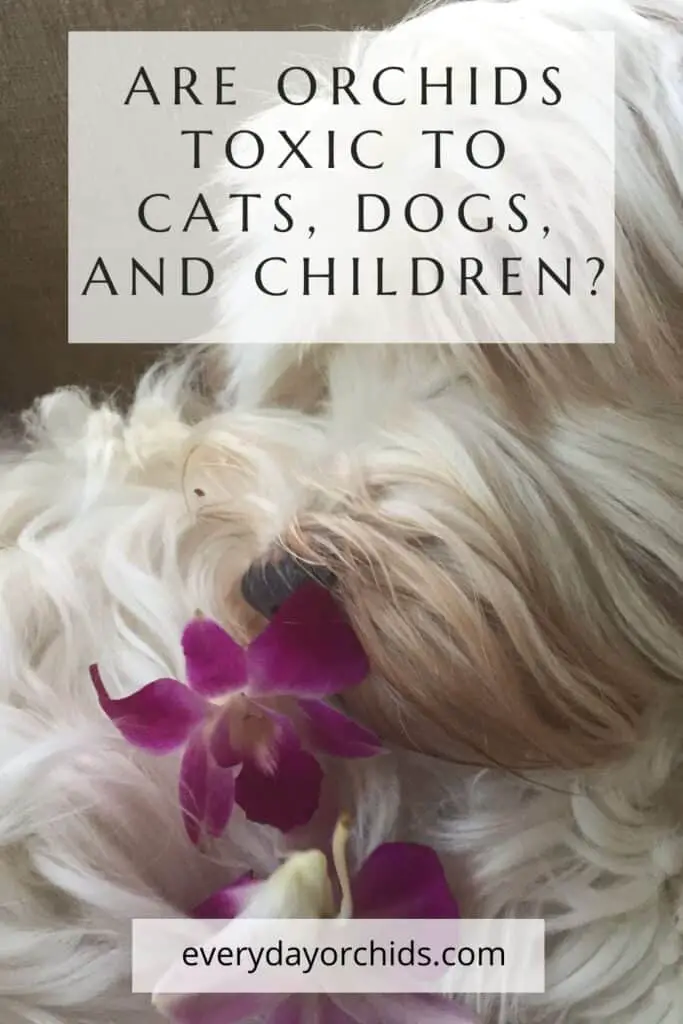As an orchid grower, you may be wondering, are orchids poisonous to cats? Are orchids poisonous to dogs or humans? If you have pets or young children in the house, this may be very important. After all, some houseplants are poisonous to animals and humans. Cats, dogs and very young children are naturally curious and ingesting a toxic or poisonous plant can have devastating consequences. Fortunately, many orchids are safe to keep in the home.
Most species of orchids are not toxic or poisonous to cats, dogs, or humans. However, if ingested, orchid parts can cause stomach upset and discomfort. For the most part, orchids are safe to have in your home if you also have pets or small children.
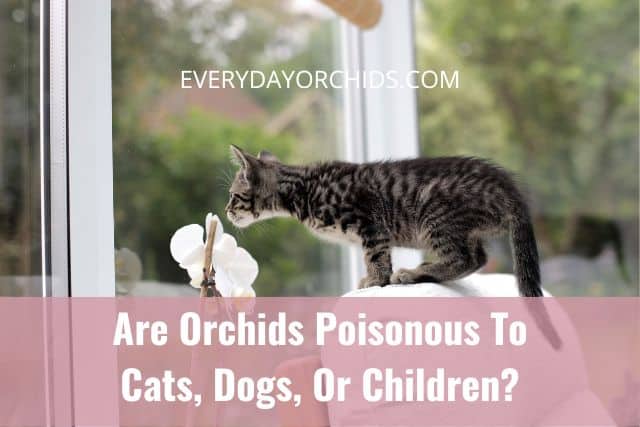
In this article, I’ll go into more detail about whether orchids are toxic to cats, dogs and humans. You’ll learn what to expect when certain parts of the orchid plant are accidentally eaten and what you should do. Plus, you’ll get some tips and ideas on how to keep your dogs and cats away from your orchid plants.
Please note that these links are affiliate links and as an Amazon Associate, I earn from qualifying purchases. Purchases made through affiliate links in this post may generate commissions at no additional cost to you. Use this link for a discounted Amazon Prime trial. Thank you for your support!
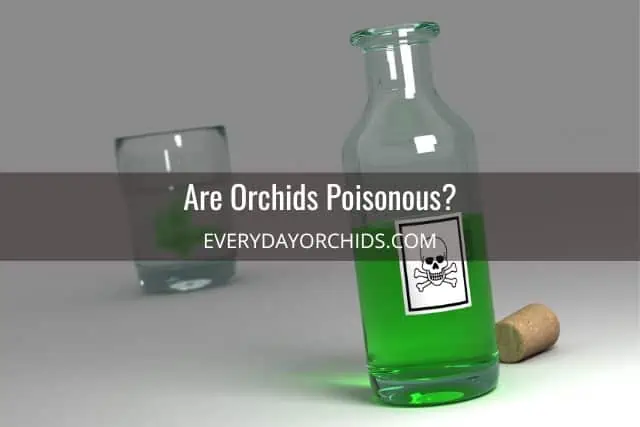
Table of Contents
Are Orchids Toxic To Cats Or Dogs?
If you love orchids and have pets, you may want to know, are orchids safe for cats? Are orchids safe for dogs? The answer is for the most part, yes.
However, there is a caveat. While most orchids are safe to keep as houseplants, remember that there are thousands of orchid varieties and hybrids known to exist today. These orchids come in a wide range of sizes, shapes, and colors.
The varieties of orchids that are commonly grown indoors and in your gardens are considered non-poisonous and non-toxic. Check out the ASPCA’s list of plants to see which ones are poisonous to dogs and cats. Thankfully, many common varieties of orchids are not poisonous to dogs or cats. Most orchids are safe houseplants to have around your pets.
Are Phalaenopsis Orchids Poisonous To Cats?
The American Society for the Prevention of Cruelty to Animals has declared Phalaenopsis orchids to be non-toxic for dogs, cats, and even horses.
In other words, Phalaenopsis orchids are not poisonous to cats or dogs.
Phalaenopsis orchids are a favorite among orchid growers and hobbyists. Knowing that these are safe orchids to have in your home around your pets may give you some peace of mind.
In addition, many popular household varieties of orchids are also not known to be toxic to humans. In fact, some are even edible.
Are Dendrobium Orchids Poisonous To Cats?
No, Dendrobium orchids are not poisonous to cats. Dendrobium orchids are not poisonous to dogs either.
Orchid varieties such as Dendrobiums, for example, are believed to have medicinal properties. Dendrobium orchid blooms are also used in Thai and Hawaiian foods as a garnish.
Are Orchids Poisonous?
No, there are very few orchid varieties that are toxic or poisonous. As mentioned above, some orchid varieties are used as edible orchids in garnishes or as part of a main dish in certain cuisines.
Some other orchids varieties are consumed as tea in traditional Chinese medicine. Many orchid varieties, due to their colorful blooms, are used to enhance feng shui in a home.
Another excellent example of edible orchids are the vanilla orchids. We make vanilla extract by extracting vanilla essence from the seed pods of the vanilla bean orchid, also known as Vanilla planifolia.
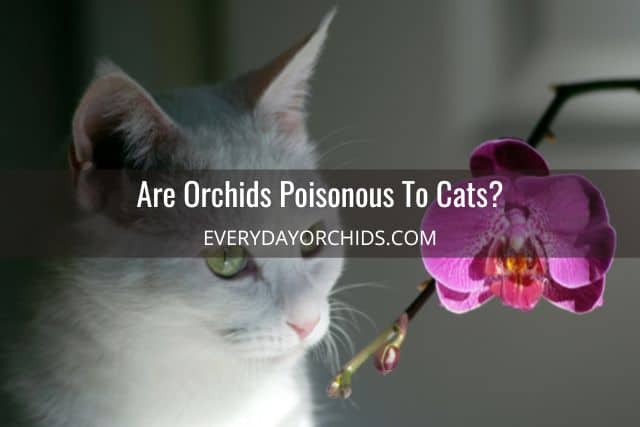
Are Orchids Poisonous To Cats? Are Orchids Safe For Cats?
If you have orchids and cats, you may be wondering what might happen if your cat eats part of your orchid. Fortunately, the orchids you have inside your house are generally not poisonous to cats and are not likely to kill your beloved pet.
Cats do tend to be very curious and exploratory, however. It is possible that they might play with your orchid or nibble on the orchid stems or leaves.
Are Orchid Leaves Poisonous To Dogs Or Cats?
No, for the most part, orchid leaves are not poisonous.
Eating part of the orchid plant might result in stomach irritation and vomiting for your pet. This will be uncomfortable for the cat and worrisome for you, but it is not life-threatening.
So, no, eating orchids will not kill your pets. But your pet could kill your orchids.
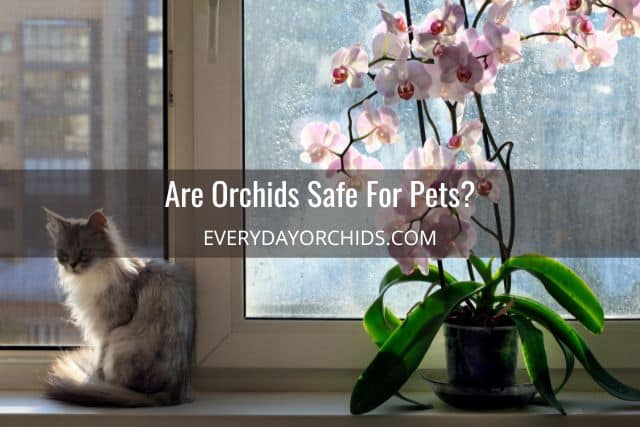
Are Orchids Safe For Pets?
Many household orchids are pet-friendly and pet-safe. It is definitely possible for your pets and your orchids to co-exist in the same space.
However, it is still best to keep your orchids out of your pets’ reach. Your pets might accidentally knock over your plant, break the orchid stems or leaves, or eat parts of the orchid.
Orchids have tough leaves and orchid roots. While the majority of orchids are not poisonous to cats or dogs, your pet could still choke on the orchid parts.
However, there are exceptions.
One popular orchid has a mild toxic rating. According to research by the University of California, Davis, Cypripedium or Lady Slipper orchids are mildly toxic to animals and humans.
The California Poison Control System lists Lady Slipper orchids as having a toxicity rating of one. This means it causes dermal reactions upon contact with the skin. These reactions include redness, rashes, and itching.
So, are orchids toxic to pets? No. Rest assured, the majority of household orchids are not toxic or poisonous and are safe to be in your home.
However, remember that there are thousands of varieties of orchids. Not all of them have been studied with regard to their effects on humans and animals when consumed. As such, there might be more orchid species in the wild that could be toxic.
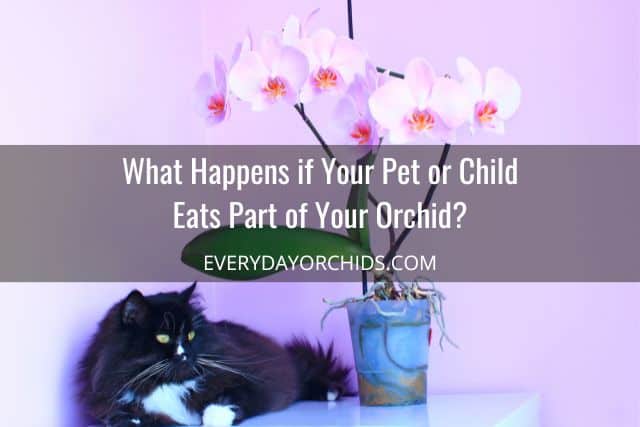
What Happens if Your Pet or Child Eats Part of Your Orchid?
Sometimes, toddlers or very young children may become curious and place an orchid bloom into their mouth. Cats or dogs may nibble on an orchid flower, leaf, or aerial root for reasons known only to the cat or dog.
Of course, as soon as you see this happen, you will stop your child or pet from what they are doing, right? Obviously, you will do your best to remove the orchid from their mouth. But what happens if your cat, dog, or small child accidentally ingests part of your orchid leaf, flower, or root?
Are Orchid Flowers Poisonous To Dogs?
For the most part, no, orchid flowers are not poisonous to dogs. As mentioned above, most household orchids are non-poisonous. Some orchid flowers are edible and are widely used in cooking and as a garnish.
However, there are still other problems that may arise if your pet or young child accidentally ingests or tries to ingest part of your orchid plant. With the exception of the orchid flowers, most other orchid parts are not edible or suitable for consumption.
Are Orchids Poisonous?
While orchids are not poisonous, there are health risks in eating certain parts of the orchid.
Orchids have tough, thick leaves and aerial roots. This can pose a choking hazard. Parts of the orchid that are hard to chew can end up getting lodged or stuck in the throat, or worse, in the windpipe.
Moreover, ingesting orchid parts may cause vomiting, stomach upset, loss of appetite, or even lethargy.
Also, while the leaves and flowers generally do not trigger any serious adverse reaction, the plant’s tuber may be a different story. Tubers have bitter substances that could potentially cause irritation in the stomach, liver, and intestine. Children may experience severe vomiting and diarrhea when they consume this bitter substance.
In the case of Lady Slipper orchids, contact with the skin could cause additional issues. These issues include mild skin reactions, rashes, itching, and redness.
Create a Barrier
Although most orchids are not poisonous, it may be a good idea to keep them out of reach from dogs, cats and small children.
If you have babies or toddlers, you can place a barrier around your orchids. This will help protect your plants. It will also keep your child from accidentally ingesting your plant, knocking over the pots or breaking your orchid plant.
If you want to prevent your pets from having access to your orchids and other plants, you can also use a baby gate. This baby gate by Toddleroo allows you to safely section out a portion of your room for your orchids, providing a safe space for plants without worrying if your baby or toddler will get into them.
Another alternative is to place your orchid collection in another room where your pets cannot go. You can also place the orchids in an area that is out of reach (though this may be more difficult for cat owners).
Do Pets Need To Go to the Vet After Eating an Orchid?
It is always best to take your pets to the vet if they have ingested parts of your orchids and have been vomiting, eating less than usual, or been lethargic, or if you are unsure of what to do.
Likewise, if your young child has accidentally eaten part of your orchid plant, it is best practice to contact your child’s pediatrician. Let them know of the situation and get their advice.
You may also want to consult with your pet’s veterinarian or your child’s pediatrician if your pet or child experiences mild dermal reactions. This may happen due to their skin coming into contact with a Lady Slipper orchid.
While your orchids at home may not be toxic, they can still cause mild adverse reactions when eaten or when coming into contact with the mucus membranes like the eyes and nose.
Keep in mind that people and animals are different. Certain substances may have different effects on different bodies. When in doubt, contact the veterinarian or pediatrician.
How To Keep Your Pets and Children From Eating Orchids
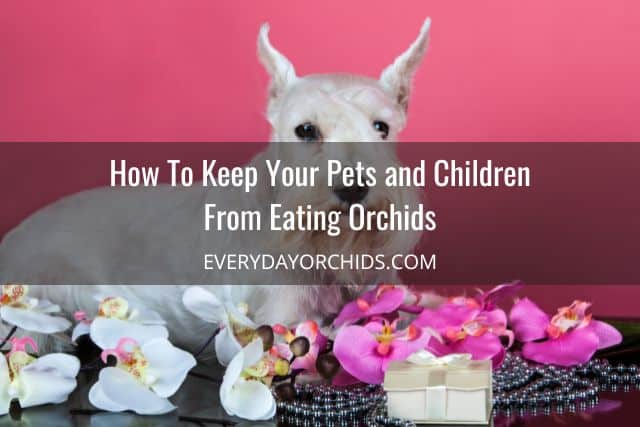
While orchids are generally not poisonous to dogs, cats or children, you still want to minimize the chances that they may nibble on your plant.
One of the ways you can keep your pets and children from getting into and accidentally eating your orchid plants is to keep the plant out of reach. This is an obvious and relatively easy intervention.
If you do have pets or small children in the house, using plastic orchid pots for your orchids would be the safest option for all involved. This way, if your orchid pot accidentally gets knocked over and falls to the ground, you at least will not have to worry about broken pot shards injuring your pets or children.
You can place your orchid in a location that is too high for your dogs or young children to reach. Put your orchids on top of the console, on a shelf, or on the center of a table.
Alternatively, you can teach your pets and kids to stay away from your plants. Establish early on that your orchids should not be touched. Teaching your pets and kids not to touch your plants will take some effort and time, but it will be worth it in the long run.
These solutions may not be as effective when it comes to cats, though. Cats can leap and reach high places. Even putting your plant on the topmost shelf would not guarantee its safety. Cats also tend to enjoy playing with plants more than dogs do.
Cayenne Pepper as a Deterrent
As such, one effective way to keep your cats from your orchid is to make it smell bad or unattractive. Cayenne pepper is sometimes used to achieve this.
Some people feel using cayenne pepper is inhumane. I personally would not use this for my cats. However, I just want to lay out all the options for you, so I am including this because maybe you want to deter stray cats from your outdoor orchids and plants. I have heard of people using cayenne pepper in this manner.
You can sprinkle a small amount of cayenne pepper on the edges of the leaves to discourage cats from coming near your orchid. However, be aware that if cayenne pepper gets into cat’s eyes, or the cat’s paws and then it licks its paws, the cat will be in distress. Ingesting the cayenne pepper will cause severe intestinal discomfort for the cat. This is why some people may feel that the use of cayenne pepper is cruel and inhumane.
Though the idea is that the mere scent of cayenne pepper should deter cats from coming closer, some curious cats will investigate further. Some cats might sniff up or lick the cayenne pepper. Keep this in mind before you use cayenne pepper, especially if your cat tends to be very curious.
Aluminum Foil as a Deterrent
Another option is to place slightly crumpled aluminum foil sheets around your orchid pots. This will deter cats from coming too close to your orchids. Cats dislike the feel of aluminum foil, especially crinkled aluminum foil, under their paws. The sound and feel of the aluminum foil may be enough to keep cats away from your orchid plants.
Citrus as a Deterrent
Cats also dislike citrus smells. To deter your cat (or any cat) from playing with your orchid, you can put some lemon and orange peels in the orchid pot. You can also dilute orange oil and lemon juice in water, put this mixture in a spray bottle, and spray it on the orchid leaves to deter cats.
Final Thoughts
Thankfully, the most popular and common household orchids are not poisonous to dogs, cats, or children. However, it is still best to keep these plants out of their reach. Many orchids have thick leaves and roots that are difficult to chew, posing a choking hazard to your pets and children. If ingested, these orchid parts can irritate the stomach and cause nausea, vomiting and upset stomach.
It is also important not to generalize and assume all orchids are safe and non-toxic. While the majority of household orchids are non-poisonous, Cypripedium Lady Slipper orchids are mildly toxic. They could cause contact-based skin irritation and other mild dermal reactions.
Moreover, many varieties of orchids, especially those that grow in the wild, have not yet been studied. As such, their effects on humans and animals when eaten are still unknown.
If you enjoyed this article, please pin it and share!
